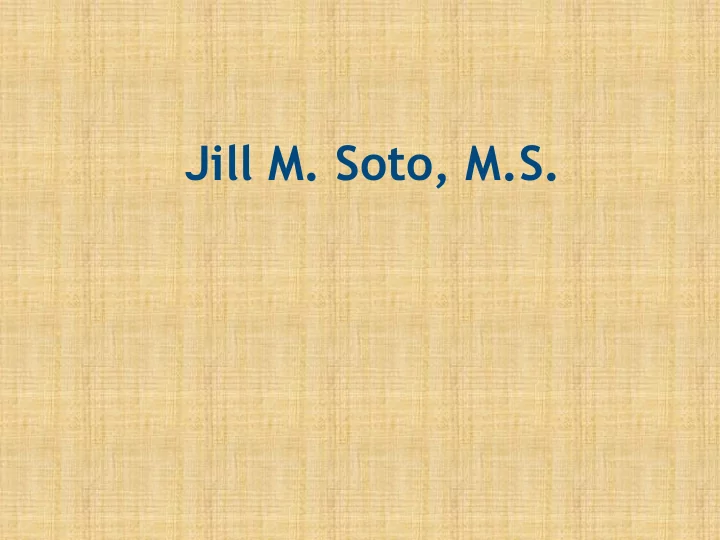

Jill M. Soto, M.S.
Intentional Curriculum Implementation: The Director’s Role in Supporting Teachers in Early Childhood Classrooms
Director’s Role • Moving to the Next Level
Goals for the webinar • Defining intentional • Curriculum implementation • Guiding principles for international directors • Supportive strategies • Review • Wrap Up
But it’s not just learning that’s important. It’s learning what to do with what you learn and learning why you learn things at all that matters. Norton Juster Learning Together with Young Children, Curtis and Carter, 2008
Intentional Teaching Intentional is to act purposefully, with a goal in mind and a plan for accomplishing it. Ann S. Epstein, 2014 Intentional teaching means teachers act with specific outcomes or goals in mind for all domains of children development and learning. Ann S. Epstein, 2014
The Meaning of Intentional • The meaning of intentional is to act purposefully, with a goal in mind and plan for accomplishing it.
Intentional-Director and Teacher • High expectations • Planning and Management • Learning-Oriented Classroom • Engaging Activities • Thoughtful Questioning • Feedback Epstein, A. S. (2014). The intentional teacher: Choosing the best strategies for young children (Rev. ed.). Washington, DC: National Association for the Education for Young Children.
Intentional Director • Directors play a supportive role during curriculum implementation and planning • Balance between supporting and telling
Guiding principles of intentional teaching • Creating a learning environment rich in materials, experiences, and interactions • Encourage children to explore materials, experiences, relationships, and ideas • Converse respectfully, reciprocally, and frequently with children Epstein, A. S. (2014). The intentional teacher: Choosing the best strategies for young children (Rev. ed.). Washington, DC: National Association for the Education for Young Children.
Guiding principles of intentional teaching • Consciously promote all areas of learning and development • Know the content that make up each area of learning • Know and use specific teaching strategies that are effective with young children
Guiding principles for the intentional director • Creating classrooms with rich materials, educated staff, strong curriculum and assessments • Encouraging teachers to interact in a meaningful way with children • Designate planning and prep time
Guiding principles for the intentional director • Provide professional development • Observe teachers and offer feedback • Know and use effective strategies for each staff member because all staff have unique needs • Remain patient during the implementation of new curriculum or the hiring of new staff
Curriculum Implementation • Professional Development • Planning time • Support • Remember it takes time
Thinking about Thinking • Coaching teachers to coach children to learn about learning is an important aspect of the scaffolding process
Directors Role • Scaffold • Support • Question at the level of inquiry
Supervision of Teachers • What do you do? • How do you do it? • When do you do it? • Why do you do it?
Role Model • Director morning check-in – How does it work? – When do you do it? – What do teachers think? • Interactions in Learning Centers – What do teachers do? – How do they monitor free play? – Are you getting what you want?
See, say, and do • I might see teachers….. • I might say….. • What I might do…. • What teachers can do….
Growing Teachers: Directors Supporting Teachers • Classroom observations • Curriculum-Professional Development
Collaborative Supervision
Collaborative Supervision • The most effective way to encourage adult learners to analyze their own practice, solve problems, and take responsibility for their own learning • When the teacher supervisor team work well they plan together, decide where to focus their inquiries, and determine what coaching is needed to enrich the teacher’s practice
Staying at Inquiry Your text here
Preparing • Think about your relationship with the teacher • Think about the skills level of the teacher • Establish goals together • Get ready to support the teacher
Observing • Avoid being intrusive • Focus on the reasons you are there • Use tools to guide your observation • Look for strengths • Look for examples of teaching and learning • Take some notes
Reflecting • Two-fold – Teachers reflections – Director reflections
Offering Feedback • Think about when and where you will have feedback conversation • Prepare for your feedback session before you have it • Validate teachers’ efforts • Support conscious decision-making • Structure the discussion as a conversation
Setting Goals • Provide information, ideas, and suggestions that relate specifically to the teachers goals and your observations • Guide the teacher to take the next steps • Summarize your plans in writing • Determine a timetable • Follow-up
Action Steps • Prep — think about teachers • Observe • Provide Feedback • Next Steps
Wrap Up • Defined intentional • Curriculum implementation • Guiding principles for the intentional director • Supportive strategies
Jill M. Soto, M.S. Assistant Director The University of Oklahoma Center for Early Childhood Professional Development 1801 N. Moore Ave, Moore, OK 73160 405-799-6383 jsoto@ou.edu
Recommend
More recommend